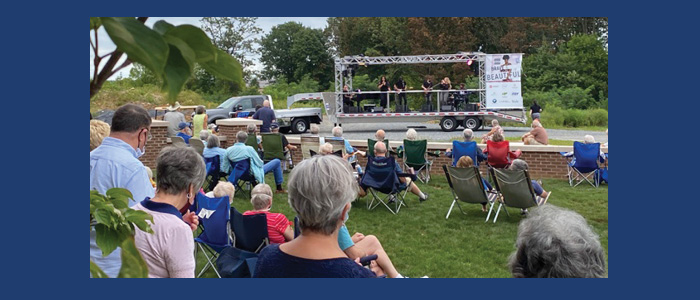
Lifelong Learning: It Does a Senior Mind & Body Good
The recent trend of seniors engaging in lifelong learning, through college courses and other endeavors, continues to grow. Embracing their love of learning not only supports a healthy brain, but a healthy body as well.
Healthier brains
Learning something new, such as a new skill or hobby, can help boost your memory. Neuroscientists at the University of Texas at Dallas conducted a study that found seniors who took on a new mentally challenging hobby saw a lasting increase in their memory skills. These researchers believe that taking on a new challenging activity—like learning to quilt, playing an instrument, or operating a computer, for example—strengthens numerous networks within the brain.

Another research study conducted by neurologists at Case Western Reserve University in Cleveland found that engaging in a lifelong pursuit of mentally challenging activities may actually help prevent Alzheimer’s disease. The study found that seniors who frequently read, played mentally challenging games like chess, or engaged in other intellectually stimulating activities are 2.5 times less likely to have Alzheimer’s, which impacts more than 5 million Americans today.
And another study out of Massachusetts General Hospital and Harvard Medical School had similar findings. Using participant interviews and brain scans, those researchers found that seniors who reported higher levels of intellectual stimulation throughout their lifetimes had a marked delay in the onset of memory problems or other Alzheimer’s-type symptoms, even though these study participants didn’t actually have any lower incidence of protein plaques on their brains. The ability to delay or even prevent the potentially debilitating symptoms of Alzheimer’s offers substantial advantages when it comes to seniors’ quality of life.
Healthier bodies

Pursuing lifelong learning activities has benefits that go beyond boosting your brain power. Cognitive neuropsychologists at the University of Sussex in England conducted a study, finding that reading for even just six minutes lowered study participants’ stress levels, slowing their heart rates and easing tension in their muscles. And lower stress has wide ranging benefits for seniors’ cardiovascular health, decreasing blood pressure and reducing the risk of a stroke or heart attack, boosting immunity, and lowering levels of depression.
Researchers at Harvard and Princeton had even more impressive findings in their research on the connection between lifelong learning and health. The study authors found that one more year of education increased life expectancy by 0.18 years. They discovered that the more educated a person, the lower their rates of anxiety and depression as well as the most common acute and chronic diseases (heart disease, stroke, hypertension, high cholesterol, emphysema, diabetes, asthma, ulcer), and they were far less likely to report that they were in overall poor health.
Now, there is a “chicken or egg” debate on whether the increased level of education caused these positive health results, or if the people who were healthier (perhaps based on lifestyle factors like drinking, smoking, eating habits, etc., or the impact of their economic standing) were simply more likely to pursue educational opportunities, but the findings are still significant.
Put on your thinking cap

There are numerous lifelong learning opportunities available to seniors. If you live in a town with a university or community college, call them or visit their website to find out what types of continuing education classes are offered; some colleges will even allow older adults to “audit” a college class—sit-in on classes for no credit, but also for little to no cost. If you don’t live near a school, there are also numerous online learning programs offered by colleges across the country.
AARP compiled a list of free or inexpensive college courses for older adults in all 50 states.
If you’re looking to take up a new intellectually stimulating hobby like quilting or painting, contact your local arts and crafts store to see if they offer classes. To learn how to play an instrument, contact a nearby high school to see if the band director can offer recommendations on teachers, or you can even do an internet search to find teachers in your area. Your local library is another great resource, providing not only a treasure trove of mentally stimulating books, but also offering programs and presentations for eager learners.
Lifelong learning at Moravian Manor Communities (MMC)
One of the many advantages of living in a Life Plan Community such as MMC, is the array of activities and events offered to residents through the community life program.

Knowing the many benefits for residents’ mental and physical health, we particularly put an emphasis on lifelong learning opportunities. From guest speakers to art classes to affinity groups like chess, bridge, and book clubs, Moravian Manor Communities provides residents with numerous ways to keep their minds active, all in a close-to-home location. Check our recent blogs on our Ukulele Group, Golf Group, or the woodshop!
MMC also has a strong partnership with the Warwick School District, offering intergenerational sharing, learning, and volunteering opportunities. One such program is our popular Socrates Café, where students from Warwick High School and residents meet for lunch and then discussion. It was an opportunity to interact and learn from each other, building relationships and community. Hopefully, this program can resume someday soon.
The Warwick School District also has offered adult education workshops, free for seniors, such as Microsoft Word and Excel, Knitting, Yoga, and Pound Rockout Workouts. Due to COVID, upcoming classes have not been announced.
Within walking distance of our two campuses, the Lititz Public Library also offers free community programs for adults, including book and hobby clubs as well as art demonstrations, films, Scrabble meet ups, and other lifelong learning programs.
Food for thought
Whether you are interested in learning about a new subject or acquiring a new skill, there are near-countless ways that lifelong learning benefits seniors. So why not challenge yourself and try something new? It’s a lifestyle choice that’s good for your mind, which in turn is good for your health!




